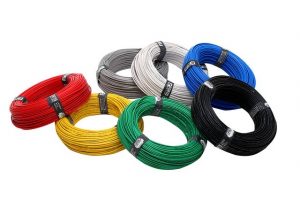
Copper and aluminum are two of the most common materials used in the construction of electrical wiring. Both metals are conductive, so electricity encounters little or no resistance when traveling through them. Aside form being conductive, though, copper and aluminum don’t share many other characteristics. As a result, each type of electrical wiring has its own strengths and weaknesses.
Copper Wiring
For over a half-century, copper wiring has been used in residential and commercial electrical systems. It’s often preferred, in fact, over aluminum wiring because of its high tensile strength. The tensile strength of copper is roughly 40% higher than that of aluminum. With a higher tensile strength, copper wiring is less likely to break than aluminum wiring. This is important considering that electrical wiring is often installing by pulling it through ports and feeders. If the wiring is weak or fragile, it may break during installation. Copper wiring has a high tensile strength to protect against breakage as well as other forms of physical damage.
Copper wiring also has a lower thermal expansion coefficient than its aluminum counterpart. In other words, it doesn’t expand as much as aluminum wiring when exposed to heat. The temperature of electrical wiring increases as electricity flows through it. Aluminum wiring has a higher thermal expansion than copper wiring, resulting in greater expansion. If the wiring expands too much, it may cause areas in which the wiring is spliced or joined to break.
Aluminum Wiring
Like copper, aluminum is conductive, so it’s become a common material used in the construction of electrical wiring. Unfortunately, aluminum wiring isn’t as strong as copper wiring, and it also has a higher thermal expansion coefficient. With that said, there are still advantages to using aluminum wiring.
Aluminum wiring almost always costs less than copper wiring. It’s not uncommon for aluminum wiring to cost just half the price of copper wiring. For a residential home, using aluminum wiring instead of copper wiring can save builders several hundred dollars. For a commercial building, the cost-savings benefits of aluminum wiring can be thousands of dollars.
In Conclusion
In addition to a lower price tag, aluminum wiring is somewhat easier to work with an copper wiring. Copper wiring is stronger, so it’s less likely to break. Aluminum wiring, however, is more flexible, making it easy to work with in small spaces. Hopefully, this gives you a better understanding of how copper wiring and aluminum wiring differs from each other.
